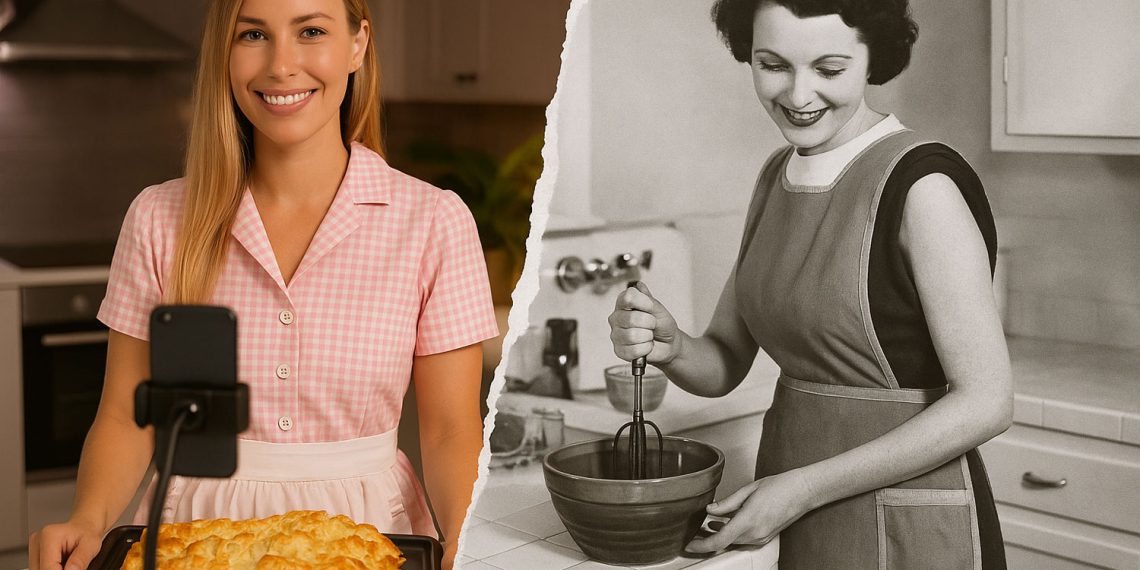They cook and bake, clean, and set the table for their husbands – and millions of people watch them do it. Tradwives – short for “traditional wives” – have taken social media by storm in recent years. Their message is clear: nothing fulfills a woman more than being a housewife devoted to her husband and children. The Tradwife movement presents itself as a nostalgic lifestyle, celebrating the idealized image of 1950s homemaking. But what happens when right-wing parties begin to exploit this trend?
The scent of vanilla fills the air. Dressed in a pastel country-style outfit, a young woman with perfectly styled hair stirs a mixing bowl. The kitchen is immaculate. Soft music plays in the background. Her baby is asleep, and her husband – she later explains – will soon return from work, tired. She’ll serve him a warm meal and take pleasure in pampering him.
This scene isn’t from a 1950s commercial. It’s from Instagram. Millions follow videos, photos, and comments like these. The women call themselves Tradwives – traditional wives. On TikTok, Instagram, and YouTube, they’ve become a growing trend.
The Return of the Perfect Housewife
Baking, cleaning, decorating, raising children, putting on makeup – for their husbands, of course. The content shared by Tradwives evokes a time when “self-fulfillment” was hardly a known concept. And that’s part of the allure. They present themselves as joyful homemakers who have willingly given up careers. Instead, they live for their families – and especially for their men.
In a world shaped by insecurity, pressure to perform, and burnout, their seemingly peaceful routines offer comfort: structured, loving, predictable. But beneath the polished surface of this “perfect world” lies more than just nostalgic flair. The movement has roots in the U.S. alt-right – a sphere where conservative values often merge with far-right ideology.
Tradwives Between Lipstick and Worldview
Not all Tradwives see themselves as political. Some, like influencer Malischka, even identify as feminists. In an interview with Tagesschau, she says: “I get an overwhelming amount of support from housewives who say: Finally, we’re being seen.” Other bloggers celebrate their roles – for example, as wives who “hold down the fort” for their husbands.
But the line between lifestyle and ideology is thin. Judith Götz, a researcher at the University of Innsbruck, warns:
“Tradwives convey far-right ideology to the general public without being seen as political actors.” It’s not just about cake recipes, she says – it’s about a very specific gender order.
“Tradwives promote a worldview also shared by right-wing extremists and Christian-conservative or fundamentalist circles. That’s why it’s attractive for far-right actors when influencers mainstream this ideology,” Götz adds.
The FPÖ and the Yearning for the 1950s
The yearning for traditional gender roles isn’t just an internet phenomenon. It’s making a political comeback as well. In Austria, for example, the FPÖ (Freedom Party of Austria) is calling for a “stay-at-home bonus” for parents who raise their children at home – a model already in place in Upper Austria since 2004. While it appears family-friendly at first glance, the bonus creates a trap for women: it makes re-entering the workforce harder, negatively impacts pensions, and reinforces outdated gender roles.
Parties like the FPÖ and Germany’s AfD (Alternative for Germany) promote the traditional family model as the “foundation of a functioning society.” Women should take care of the household and children, while men earn the money. Since many Tradwives embody and promote exactly this model – reaching millions – they’ve become effective multipliers for these ideas.
Anti-Feminism as a Core Element of the Far Right
According to a study by Ipsos, more than one-third of Millennials (those born between 1980 and 2000) believe that a man who stays home with the children is “not a real man.” Views like this provide fertile ground for anti-feminist propaganda – cleverly disguised in aesthetic imagery of apple pies, perfectly folded laundry, and smiling wives.
According to Germany’s Federal Agency for Civic Education (Bundeszentrale für politische Bildung), anti-feminism plays a central role in far-right ideology. It is an ideology actively opposed to feminist positions and rooted in rigid traditional gender norms: men are portrayed as strong, combative providers, while women are seen as caring and apolitical. The far-right worldview inherently places women as subordinate to men. Most Tradwife videos present exactly this image and aim to spread it among a younger audience.
Götz emphasizes that anti-feminism is a core component of far-right ideology. Women are portrayed as nurturing and apolitical – the opposite of the emancipated woman who asserts herself independently. The Tradwife movement plays into this narrative and becomes, often without explicitly stating it, a Trojan horse in political discourse.
Feel-Good Imagery with Far-Right Ideology
The connection between Tradwives and right-wing ideology is especially clear in the case of Lukreta, a German women’s network. Officially, they advocate for “women’s rights” – but on Instagram, they celebrate “Stolzmonat” with women draped in German flags. It’s a calculated counter-narrative to queer Pride Month, intended to incite hatred against LGBTQ+ people, staged by right-wing conservative and extremist actors. Lukreta merges wholesome imagery with far-right ideology – and maintains direct ties to Germany’s AfD.
The Tradwife as Influencer: Branding, Media, and Millions
While traditional housewives received no compensation for their work, some Tradwives today earn significant income. Some have built entire businesses around their personal brand. One example is Ballerina Farm: Hannah Neeleman, a mother of eight with over 10.1 million followers, doesn’t just sell a lifestyle – she sells actual products. What looks like a spontaneous scene at the stove is in fact curated content – complete with camera crew, marketing strategy, and an online shop.
This shows that behind the supposedly simple life lies a sophisticated business model. The role of the housewife is being professionalized – and idealized at the same time.
The Dark Side of the Tradwife Illusion
As harmonious as the images appear, the life of a Tradwife can come with serious risks. Emotional and financial dependence on a husband can be dangerous. Without independent employment, a woman may have few options in crisis situations – particularly in toxic or abusive relationships.
“If you’re financially dependent on a male breadwinner and don’t have your own income, it becomes much harder to leave an abusive relationship,” warns Judith Götz, an expert in anti-feminism and right-wing extremism.
At the same time, Tradwives glamorize unpaid care work on social media – without showing its emotional or physical toll. The image of femininity they present is romanticized and detached from reality.
In the end, the Tradwife movement is more than a fleeting social media trend. It reflects a deeper cultural longing for clarity and simplicity – one that easily becomes a vessel for right-wing ideologies. What starts with a lovingly set dinner table can quickly become a political platform. And while millions of likes are collected, outdated gender roles quietly make their way back to the center of society.
The rights to the content remain with the original publisher.



